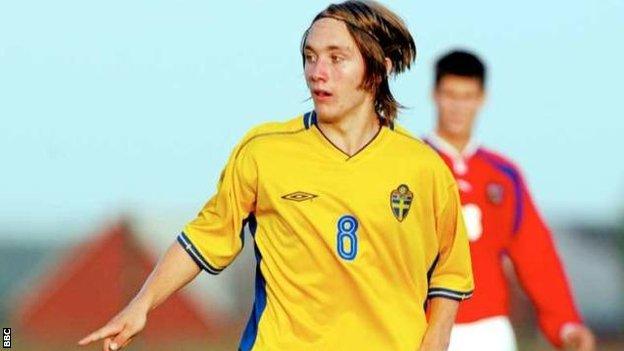Former Inter Milan youngster likens the club to a prison
- Published

Martin Bengtsson
Former Inter Milan player Martin Bengtsson has revealed how he tried to slit his wrists because of depression.
After trials with Chelsea and Ajax, Bengtsson joined Inter at 17 but described his time at the club's youth academy as like "being in a prison".
"I needed to escape and the razors became my way out. I cut as hard as I could, I needed to get out," he said.
Stoke aim to combat depression
The Italian club refused to comment on the conditions inside their youth academy when contacted by BBC Sport.
"I was really sick, I heard voices and I started to lose the feeling of whether it was night or day," he added.
"What I remember is that I was walking around in a big cloud and I couldn't handle it anymore."
Ahead of Sunday's Milan derby, Bengtsson has told the BBC's World Football programme how his time at Inter became unbearable after some youth players were caught smoking marijuana.
"They had a problem at the training camp and we got punished because (some players) had smoked marijuana on a balcony and we got a punishment, all the players, even those who hadn't had anything to do with it," said Bengtsson, who was born in Sweden.
"For a couple months we almost lost our freedom to go out of our house in Milan and to buy groceries. I got very depressed by the feeling of being in a prison and being locked in."
Bengtsson turned to music as his salvation, buying a guitar and writing songs. But this inadvertently led to him reaching a crisis point.
"One day after I came back from a match with the Swedish national team in Finland, the cleaning lady had thrown all my papers away, all my lyrics and everything," he said.
"For me, that was a very big thing because that was my soul on the floor there."
It was that which led to his attempt to take his own life. Although he is thankful he survived, his football dream was over.
Bengtsson eventually formed an industrial punk rock group called Waldemaar, external and is now also working on a novel. But he has a warning for young players with dreams of making it as a professional.
"There's something very, very wrong with the way of treating players and the mentality of how we see if you're strong enough," he said.
"You become a stone in many ways and it's hard for you to then go out in the real world and start a new life because you have so much anger within you."
You can hear the full interview on the BBC's World Football programme.
- Published5 October 2012
- Published5 October 2012
- Published30 November 2011